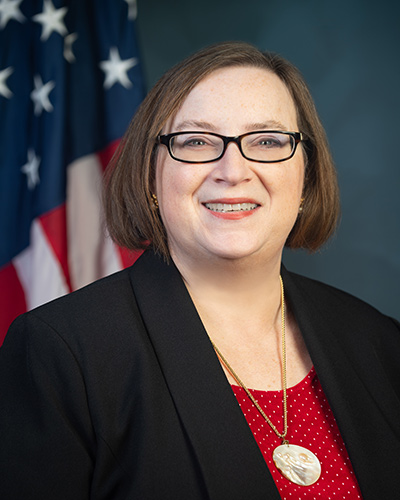In the first part of an exclusive interview with RMD, Federal Housing Administration (FHA) Commissioner Julia Gordon described how the Home Equity Conversion Mortgage (HECM) program is a far more longstanding financial product for seniors when compared with other more recent and untried equity-tapping tools, particularly on the fintech side. She also addressed how her history of consumer advocacy helped shape her perspectives on HECM.
In the latest part of the interview, Commissioner Gordon describes the working relationship FHA maintains with the reverse mortgage business, some of the changes and administrative actions the HECM program has undergone over the past few years and hints at the performance of the HECM book of business inside the Mutual Mortgage Insurance Fund (MMI) Fund.
Industry and FHA collaboration, the importance of new information
When asked about what she has observed regarding FHA’s collaborations with members of the reverse mortgage industry, Gordon said that this has been a positive development based on what she’s seen and only leads to more substantive positive outcomes for consumers.

“One of the most favorable developments I’ve seen in recent years is the collaboration between the members of the reverse mortgage industry and the consumer advocates who work with borrowers in this case,” she said. “FHA, currently, is working well with the industry and with those consumer advocates, and we find it extremely useful when they work with each other.”
When asked if she sees a substantial difference between the approaches toward HECM taken by the Trump and Biden administrations, Gordon related that it would be easier to remain focused on the actions of the Biden administration.
“I know just speaking personally and hopefully for all the members of my team, what we want to do is we want to tend to the needs of borrowers and communities when it comes to mortgage finance,” she said. “And so, what we want to do is make sure the HECM program is as beneficial and safe a product as it can possibly be.”
Part of that is staying current on all the major developments which take place surrounding the HECM product and program, since many observers who express an interest in HECM have a tendency to operate off of information which may be out-of-date, she explained.
“Of course, there are — and this is true of the whole mortgage and mortgage servicing industries — some participants who still look back at what happened in the run-up to the financial crisis and then during the crisis who, I think, are working off of old information,” she said. “Not necessarily incorrect, but old and outdated information. And so, I think it’s very useful when we’re talking about approaches to the HECM program that we’re really looking at the HECM program as it is today in 2022 as opposed to what may have happened a decade and a half ago.”
The HECM book of business
When asked about how the HECM book of business is performing inside the MMI Fund, Commissioner Gordon did not divulge any specific details but did take time to characterize what is currently being observed.
“HECM performance is still strong,” she said. “Of course, we’ll have to wait for November to tell you the results of this year’s Annual Report to Congress. But right now, HECM performance remains strong. I do think there are legitimate questions about combining the forward program and the HECM program inside the MMI Fund.”
These are questions that may or may not lead to policy, but Gordon described that FHA staff is looking at different options available to them in the form of legislation and potential administrative action, she said.
“I think you probably know that HECM used to be inside the General Insurance and Special Risk Insurance (GI/SRI) Fund, and that’s something we’re looking at. But, the reasons for that have nothing to do with the HECM performance at the moment. We have made no decisions whatsoever concerning what goes in or out of the MMI Fund, I just use that as an example of something that we will look at in the same way as we will strategically look at everything else.”
The impact of having a full-time FHA Commissioner
While Commissioner Gordon has only been serving in her role for around two months, policies that have come out of FHA during that time have managed to have an impact on the HECM program. She recounted some of what she and FHA have been working on.
“We have a lot of policy that has come out recently, both with respect to forward and reverse mortgages, and you’ve probably seen all of those Mortgagee Letters (MLs),” she said. “We are trying, again, to center the needs of people in a pandemic or — hopefully soon — post-pandemic environment, making sure that flexibilities that came into play because of COVID can be extended as they’re still needed.”
As noted at the time of her confirmation, many decisions regarding the administration of FHA were deferred until after the confirmation of the full-time commissioner. Between the time she was nominated by President Biden and subsequently confirmed by the Senate, over a year had elapsed which left FHA at something of a disadvantage. Now, Commissioner Gordon hopes that her confirmation will bring more swift developments to the agency.
“What I hope the impact will be having a confirmed FHA Commissioner is that we can make decisions quickly, we can respond to any changing conditions efficiently as we need to, and we can make sure that everything we’re doing with all of our loan programs corresponds with HUD’s strategic plan,” she said. “That plan is to protect homeownership, to serve underserved communities and to help put people and communities in a better position than they were in even before COVID to the best of our ability. That’s what we’re working on.”
Look for the final part of our interview with Commissioner Gordon on RMD soon.





